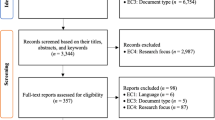Abstract
This paper explores the public awareness that there presently exists a crisis in mathematics education and a “dumbingdown" of the curriculum, examines the nature of this crisis and argues that there has been a lowering of cultural, pedagogical and cognitive expectations with respect to most learners. The notion of cognitive development in mathematics education is re-examined and a model of how the concepts of learners can be transformed in the very process of engaging with the conceptual revolutions that defined geometry is proposed. The importance of cultivating a meta-narrative in support of metacognition and the development of cognitive growth are stressed.
Similar content being viewed by others
References
Berry, J. (1996). Do not shirk a testing subject. Daily Mail, Tues. Dec. 3.
Carson, R. & Rowlands, S. (2005). Teaching the conceptual revolutions in geometry. Proceedings, eighth international history, philosophy, & science teaching conference, Leeds, England. July 15-18, 2005.
Chalmers A. (1999). What is this thing called science? (3rd ed). Buckingham, UK, Open University Press
Damasio A. (1994). Descartes’ error: Emotion, reason, and the human brain. New York, Avon Books
Damerow P. (1996). Abstraction and representation: Essays on the cultural evolution of thinking. Dordrecht, NL, Kluwer
Davydov V.V. (1988), Problems of developmental teaching: The experience of theoretical and experimental psychological research (part 2). Soviet Education 30(9): 3-83
Dubinsky, E. (1991). Reflective abstraction in advanced mathematical thinking. In D. Tall (Ed.)., Advanced mathematical thinking. Dordrecht, NL: Kluwer.
Dreyfus T. Eisenberg T. (1986). On the aesthetics of mathematical thought. For the Learning of Mathematics 6(1): 2-10
Egan K. (1983). Education and psychology: Plato, Piaget, and scientific psychology. New York, Teachers College Press
Heath T. (1956). The thirteen books of Euclid’s elements (vol. I). New York, Dover
Henry, J. (2005). State school pupils banned from doing “real maths" GCSE. The Daily Telegraph. Retrieved January 25, 2007 from: http://www.telegraph.co.uk/news/main.jhtml?xml=/news/2005/06/19/nmath19.xml
Higginson, W. (2000). Amusing about aesthetics and mathematics. In J. McLoughlin (Ed.), Proceedings of the 2000 annual meeting. Canadian Mathematics Education Study Group. St. John’s, Newfoundland: Topic Group A, Memorial University of Newfoundland.
Jurgensen R., Donnelly A., Dolciani M. (1965). Modern geometry: Structure and method. Boston, Houghton Mifflin Company
Mathematics Association. (1923). The teaching of geometry in schools. Mathematics Association. London: G. Bell & Sons.
Mathematics Association. (1939). A second report on the teaching of geometry in schools. Mathematics Association. London: G. Bell & Sons.
Papert S. (1978). The mathematical unconscious. In J. Wecheler (Ed.), On aesthetics and science. Cambridge, MA, MIT Press, pp. 105-120
Piaget, J. (1977a). Logic and psychology. In H.E. Gruber & J.J. Voné che (Eds.), The essential Piaget. New York: Basic Books. (Original work published 1952)
Piaget, J. (1977b). Science of education and the psychology of the child. In H.E. Gruber & J.J. Voné che (Eds.), The essential Piaget. New York: Basic Books. (Original work published 1965)
Piaget, J. (1977c). Comments on mathematics education. In H.E. Gruber & J.J. Voné che (Eds.), The essential Piaget. New York: Basic Books. (Original work published 1972)
Rowlands, S. (2006). A cultural-historical approach to teaching geometry, Part 2: The results of a pilot study. Proceedings of the day conference. The University of Bristol, 17th June. British Society for Research into Mathematics Education informal proceedings, 26(2).
Sinclair N. (2001). The aesthetic is relevant. For the Learning of Mathematics 21(1): 25-33
Sinclair N. (2002). The kissing triangles: The aesthetics of mathematical discovery. International Journal of Computers for Mathematics Learning 7, 45-63
Skemp R.R. (1987). The psychology of learning mathematics. London, Erlbaum
S⃥erra M. (1997). Discovering geometry: An inductive approach. Berkeley, CA, Key Curriculum Press
Simson, R. (1834). The elements of Euclid. Philadelphia, PA: Desilver, Jr. & Thomas.
Smith Report. (2004). Making mathematics count. The report of Professor Adrian Smith’s inquiry into post-14 mathematics education. London: Her Majesty’s Stationary Office.
Thom R. (1973). Modern mathematics, Does it exist? The 2nd international conference in mathematics education. Cambridge, UK, Cambridge University
Vygotsky, L.S. (1987). The collected works of L.S. Vygotsky, Volume 1: Problems of general psychology. New York: Plenum Press.
Woodhead C. (2002). Class war: The state of British education. London, Time Warner
Author information
Authors and Affiliations
Corresponding author
Rights and permissions
About this article
Cite this article
Carson, R.N., Rowlands, S. Strategies for Affecting the Necessary Course of Cognitive Growth as an Integral Part of Curricular and Instructional Planning. Interchange 38, 137–165 (2007). https://doi.org/10.1007/s10780-007-9020-5
Published:
Issue Date:
DOI: https://doi.org/10.1007/s10780-007-9020-5



